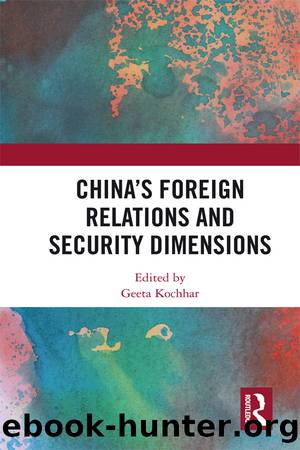China's Foreign Relations and Security Dimensions by Geeta Kochhar

Author:Geeta Kochhar [Kochhar, Geeta]
Language: eng
Format: epub
ISBN: 9780367735067
Google: qGsHzgEACAAJ
Goodreads: 55872493
Publisher: Taylor & Francis Group
Published: 2020-12-18T00:00:00+00:00
Hence as indicated earlier, now the Chinese government is increasingly getting information through public opinion surveys undertaken by the survey company and through monitoring of the internet. According to Dr Peter Thomas, without ideology there is no legitimacy. The Chinese government is increasingly dependent on good economic development to ensure the internal stability of the country. Not only that, the Chinese government is also increasingly dependent on evoking nationalism among the Chinese people to engage them politically. Through this, the Chinese government is indirectly securing its waning legitimacy from the Chinese people. From the Communist Party leaderâs perch in Beijing, Chinese society looks like a cauldron boiling over with unrest. The leaders follow closely â and nervously â the increasing frequency, scale, and violence of protests throughout the country. Under their direction, the sociologists and public security bureaucracies have undertaken remarkably frank scholarship on the incidence and underlying causes of social protest. Everything they do â in both foreign and domestic policy â is aimed at trying to keep the lid on (Shirk, 2007: 56).
This indicates that Chinese leaders are always on alert and in actions for the prevention of any kind of unrest, which has potential to turn into huge demonstration such as Tiananmen Square.
Linda Jakobson, former director of the SIPRI China and Global Security Programme, has lived and worked in China for over 15 years and is fluent in Chinese. Currently, she is an independent researcher, and her views on public opinion are as follows:
The role of public opinion in shaping Chinaâs foreign policy is a hotly debated phenomenon both inside and outside China. While there are numerous cases in which public opinion openly has had a direct impact on domestic policy, in the realm of foreign policy it is more difficult to unequivocally make the same link. Yet, it is increasingly apparent that within the Chinese media and online community there are groups that strive to influence the formulation of foreign policy.
(Jakobson & Knox, 2010: 41)
Download
This site does not store any files on its server. We only index and link to content provided by other sites. Please contact the content providers to delete copyright contents if any and email us, we'll remove relevant links or contents immediately.
| Anthropology | Archaeology |
| Philosophy | Politics & Government |
| Social Sciences | Sociology |
| Women's Studies |
Born to Run: by Christopher McDougall(7127)
The Leavers by Lisa Ko(6948)
iGen by Jean M. Twenge(5416)
Sapiens by Yuval Noah Harari(5371)
Spare by Prince Harry The Duke of Sussex(5197)
The Kite Runner by Khaled Hosseini(5179)
Machine Learning at Scale with H2O by Gregory Keys | David Whiting(4313)
Bullshit Jobs by David Graeber(4190)
Never by Ken Follett(3957)
Goodbye Paradise(3810)
Livewired by David Eagleman(3775)
Fairy Tale by Stephen King(3399)
A Dictionary of Sociology by Unknown(3085)
Harry Potter 4 - Harry Potter and The Goblet of Fire by J.K.Rowling(3074)
The Social Psychology of Inequality by Unknown(3031)
The Club by A.L. Brooks(2925)
Will by Will Smith(2920)
0041152001443424520 .pdf by Unknown(2846)
People of the Earth: An Introduction to World Prehistory by Dr. Brian Fagan & Nadia Durrani(2738)
